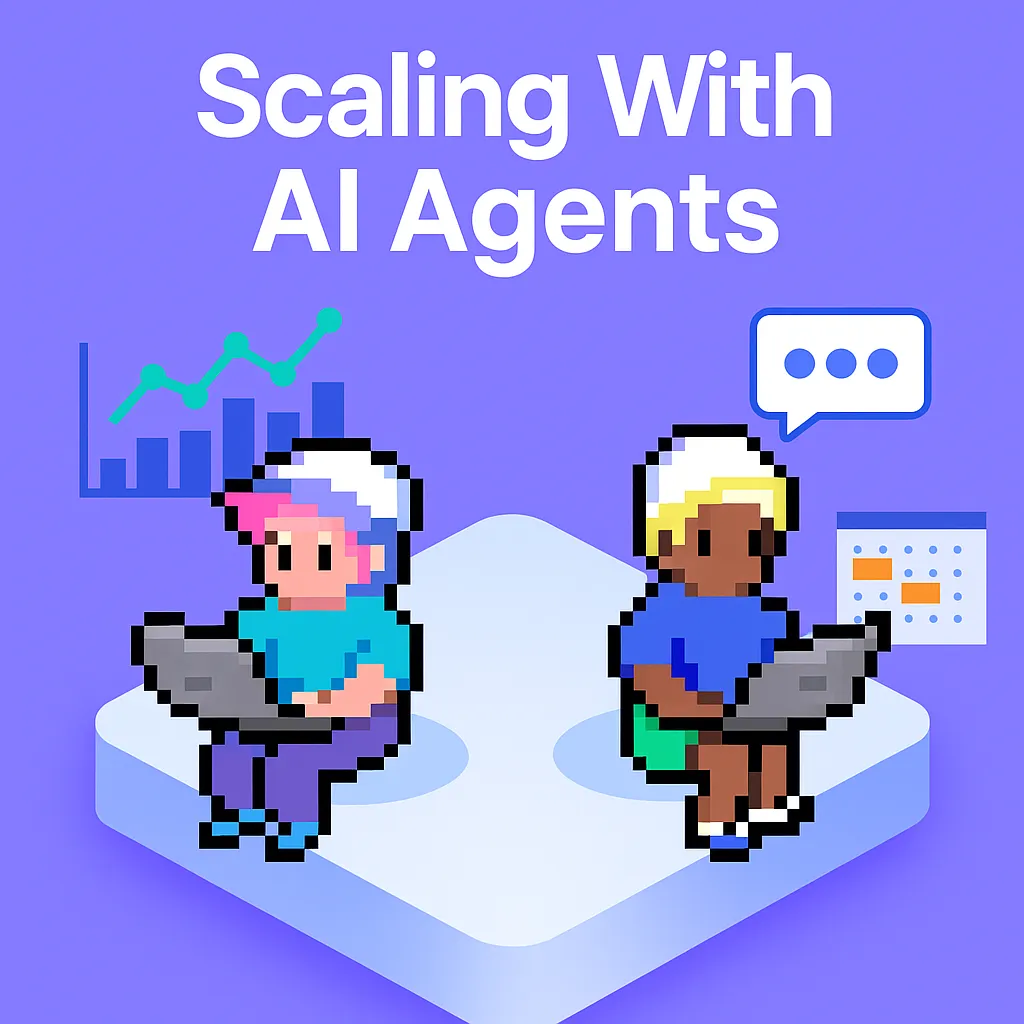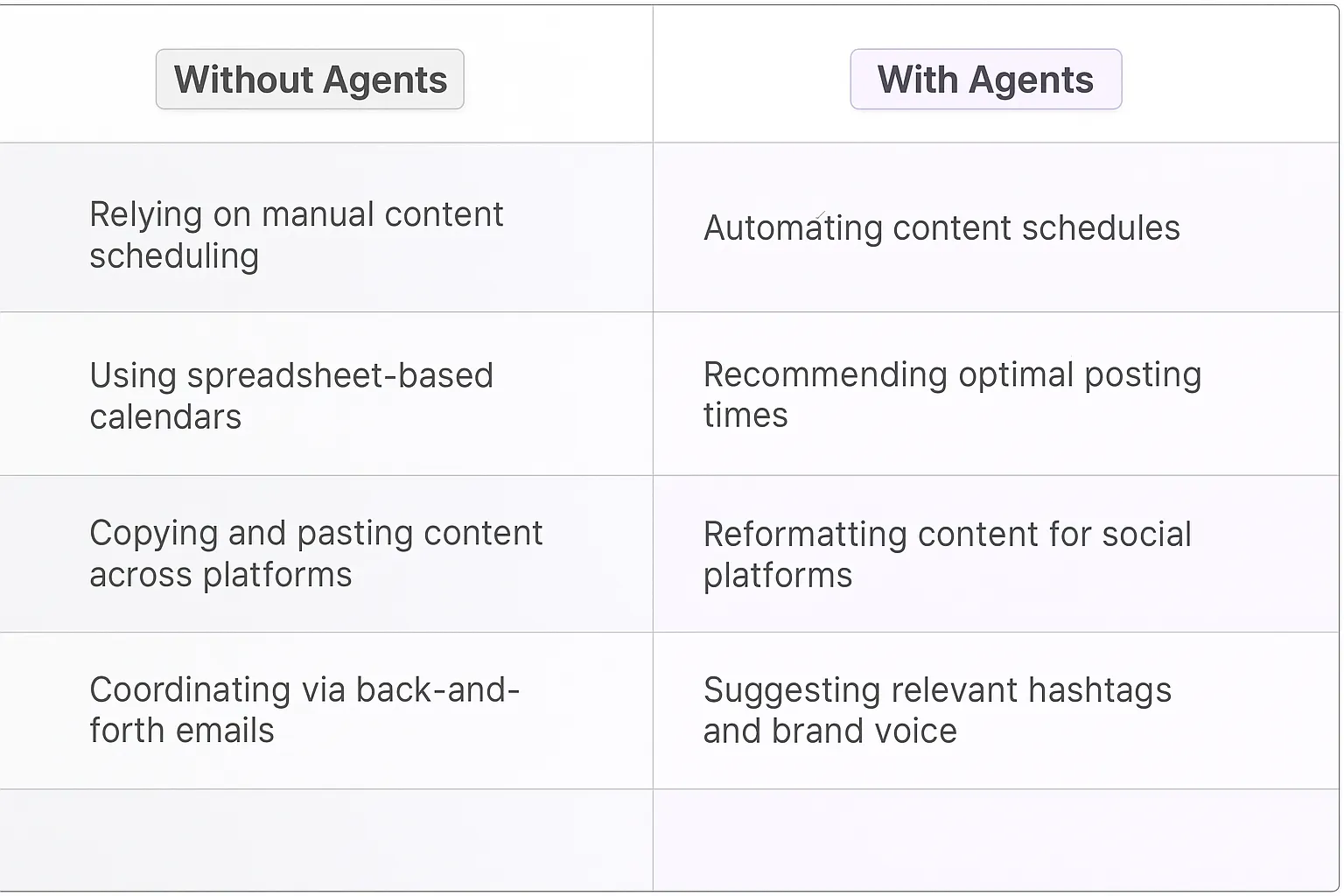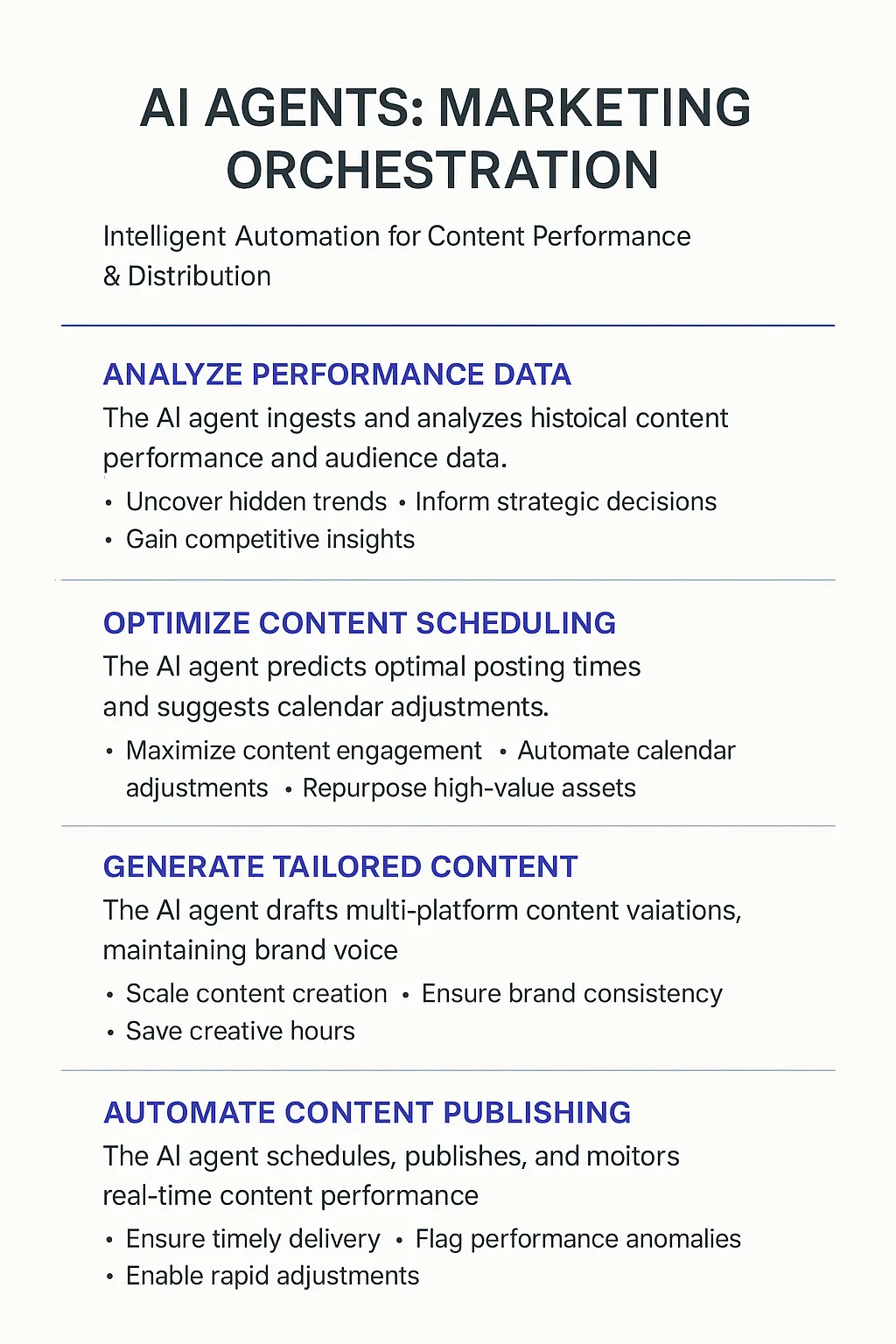CoSchedule
Understanding CoSchedule's Marketing Orchestration Platform
CoSchedule stands as a marketing orchestration platform that unifies content planning, social media management, and campaign execution. The platform brings order to complex marketing operations through its calendar-centric approach, enabling teams to visualize and coordinate all their marketing activities in one place. Unlike basic project management tools, CoSchedule specifically addresses the unique workflows and dependencies inherent in marketing operations.
The platform's core strength lies in its unified marketing calendar, which serves as a single source of truth for all marketing activities. Teams can plan, schedule, and execute campaigns across multiple channels while maintaining visibility into workloads and deadlines. The social media scheduling capabilities allow for consistent content distribution, while the workflow automation tools eliminate manual handoffs between team members.

Benefits of AI Agents for CoSchedule
What would have been used before AI Agents?
Marketing teams traditionally relied on manual content scheduling, spreadsheet-based editorial calendars, and endless back-and-forth emails to coordinate publishing schedules. Social media managers spent hours copying and pasting content across platforms, while content strategists juggled multiple tools to maintain publishing consistency. The process was fragmented, time-intensive, and prone to human error.
What are the benefits of AI Agents?
AI Agents transform CoSchedule's marketing orchestration capabilities through intelligent automation and predictive insights. These digital teammates analyze historical content performance data to recommend optimal posting times across channels, increasing content reach and engagement.
The agents handle routine tasks like reformatting content for different social platforms, suggesting relevant hashtags, and maintaining consistent brand voice across all marketing materials. This allows marketing teams to focus on high-value creative work rather than repetitive administrative tasks.
A key advantage is the agents' ability to learn from content performance metrics over time. They identify patterns in audience engagement and automatically adjust scheduling recommendations based on real-world results. This creates a continuous optimization loop that would be impossible to achieve manually.
For content strategy, the agents provide data-driven insights about content gaps, topic opportunities, and audience preferences. They analyze competitor content, track industry trends, and flag potential content opportunities before they become mainstream.
The integration of AI Agents also enables real-time content adjustments. If certain pieces perform exceptionally well, the agents can automatically reschedule similar content into high-engagement time slots and suggest ways to repurpose successful content formats across channels.
This level of intelligent automation and optimization represents a fundamental shift from the traditional manual approach to marketing orchestration. Teams using CoSchedule with AI Agents typically see significant improvements in content engagement rates and substantial time savings in their content operations.

Potential Use Cases of AI Agents with CoSchedule
Marketing teams using CoSchedule can leverage AI agents to transform their content planning and execution. The integration creates a powerful system for managing complex marketing calendars and campaigns while maintaining brand consistency.
Processes
- Content calendar optimization - AI agents analyze historical performance data to suggest optimal posting times and content mix across channels
- Marketing campaign coordination - Digital teammates can monitor campaign progress, flag potential scheduling conflicts, and ensure deliverables stay on track
- Social media content distribution - AI helps schedule and distribute content across platforms while maintaining brand voice and timing
- Team resource allocation - Smart scheduling ensures proper workload distribution and prevents bottlenecks in content production
Tasks
- Draft social media copy variations based on campaign briefs and brand guidelines
- Generate content ideas aligned with marketing objectives and audience interests
- Create customized content calendars based on team capacity and priorities
- Monitor content performance metrics and provide optimization recommendations
- Schedule content reposting at peak engagement times
- Flag duplicate content or scheduling conflicts before they occur
- Generate performance reports highlighting key metrics and trends
- Maintain consistent posting cadence across marketing channels
The combination of CoSchedule's robust marketing calendar capabilities with AI-powered automation creates a force multiplier for marketing teams. This integration enables marketers to focus on strategy and creativity while digital teammates handle repetitive scheduling and coordination tasks.
For growing marketing teams, this means better resource utilization, fewer missed deadlines, and more consistent content delivery. The AI agents serve as a virtual content operations team - coordinating schedules, maintaining workflows, and ensuring nothing falls through the cracks.

Industry Use Cases
Marketing teams deploying CoSchedule AI agents gain a significant edge in their content operations. These digital teammates excel across multiple marketing disciplines, each bringing specialized capabilities to different industry contexts. From enterprise marketing departments to boutique agencies, the applications are both practical and transformative.
The real power emerges when examining specific industry implementations. Media companies use CoSchedule AI agents to maintain consistent publishing schedules across multiple channels while maintaining brand voice. E-commerce marketing teams leverage them to coordinate product launches and seasonal campaigns with precision. B2B organizations tap into their capabilities for complex, multi-touch marketing programs that require tight orchestration.
What makes these use cases particularly compelling is how the AI adapts to each industry's unique marketing cadence and requirements. The technology doesn't just execute tasks - it learns from patterns in your marketing operations to suggest improvements and identify opportunities that humans might miss. This creates a feedback loop that continuously enhances marketing performance.
Looking at the data from early adopters, we're seeing 40-60% reductions in time spent on routine marketing coordination tasks. But the more interesting metric is the 3-4x increase in marketing campaign consistency and timing accuracy. These aren't just efficiency gains - they represent a fundamental shift in how marketing teams operate.
Marketing Agency Growth with CoSchedule AI
Marketing agencies face intense pressure to deliver compelling campaigns while managing multiple client deadlines and expectations. The reality is that even top-performing agencies struggle with the sheer volume of content creation, approval workflows, and campaign optimization needed across dozens of clients.
CoSchedule's AI capabilities transform how agencies tackle these core challenges. When integrated into a marketing agency's workflow, the AI analyzes historical campaign performance data to identify the most effective content types, messaging approaches, and posting times for each unique client audience. This means account managers can focus on strategy and client relationships rather than getting bogged down in tactical execution.
A practical example: An agency managing social media for 15 different B2B software clients can leverage CoSchedule AI to automatically generate variations of social copy based on each client's brand voice and past engagement metrics. The AI learns from thousands of previous posts to understand which content elements - from hashtag usage to post length to call-to-action placement - drive the highest engagement for specific audience segments.
The network effects are particularly powerful here. As the AI processes more campaign data across the agency's client portfolio, it builds increasingly sophisticated pattern recognition for what works in different industries and audience contexts. This creates a compounding advantage where each new client benefits from the aggregate learning of the entire system.
For agency leaders focused on scaling their business, this AI-powered approach addresses the classic services company challenge of linear revenue growth tied to headcount. By automating routine content tasks while improving performance, agencies can take on more clients without proportionally increasing staff - fundamentally changing the unit economics of the business.
E-commerce Growth Acceleration with CoSchedule AI
E-commerce businesses operate in an environment where content velocity and precision timing make the difference between capturing sales and losing customers to competitors. The challenge isn't just creating product descriptions and promotional content - it's orchestrating hundreds of marketing touchpoints across multiple channels while maintaining brand consistency.
CoSchedule's AI analyzes purchasing patterns, seasonal trends, and customer behavior to optimize when and how products are promoted. For example, when a fashion retailer launches their fall collection, the AI examines historical data to identify the optimal content mix across email, social, and web channels that drives the highest conversion rates.
The system's pattern recognition capabilities shine during high-stakes shopping periods like Black Friday and Cyber Monday. By processing data from previous years' campaigns, the AI predicts which product combinations and promotional messaging will resonate most strongly with different customer segments. This allows e-commerce teams to pre-build targeted content that matches buyer intent at specific points in the shopping journey.
A fascinating network effect emerges as the AI processes more transaction data - it starts detecting subtle correlations between content engagement and purchase behavior. For instance, the system might discover that customers who engage with user-generated content featuring specific products are 3x more likely to complete a purchase within 48 hours. These insights help e-commerce marketers shift from gut-based decisions to data-driven content strategies.
The economics are compelling: traditional e-commerce marketing relies heavily on paid acquisition, but AI-optimized organic content creates a sustainable growth engine. When content resonates more effectively with target audiences, businesses reduce their reliance on paid channels while increasing customer lifetime value through better engagement.
Considerations and Challenges
Implementing CoSchedule AI agents requires careful planning and awareness of several key factors that can impact success. The integration process involves both technical and operational hurdles that teams need to navigate.
Technical Considerations
API rate limits pose a significant constraint when scaling CoSchedule AI agent usage across larger teams. Organizations need to monitor usage patterns and implement request queuing systems to prevent disruptions. Data synchronization between CoSchedule and existing marketing tools demands robust error handling and fallback mechanisms.
Custom workflows often require specialized API endpoints and careful management of authentication tokens. Teams should establish monitoring systems to track API health and performance metrics to maintain reliable agent operations.
Operational Challenges
Marketing teams frequently face adoption resistance when introducing AI agents into established workflows. Content creators and managers may worry about maintaining brand voice consistency when AI agents handle social media scheduling and content suggestions.
Training requirements present another hurdle - teams need dedicated time to learn optimal prompt engineering and understand how to effectively collaborate with their digital teammates. Clear guidelines around AI agent capabilities and limitations help set realistic expectations.
Integration Complexity
CoSchedule AI agents must seamlessly connect with existing marketing technology stacks. This integration complexity increases with the number of tools in use. Teams should map data flows between systems and establish clear protocols for handling conflicts or inconsistencies.
Security configurations and permission settings require careful consideration to maintain appropriate access levels while enabling AI agents to perform their intended functions. Regular audits help ensure compliance with organizational security policies.
Resource Requirements
Successful implementation demands dedicated technical resources for initial setup and ongoing maintenance. Organizations need to allocate budget for potential infrastructure updates and account for increased computing resources as AI agent usage scales.
Teams should also factor in costs for training, documentation development, and potential consulting support during the implementation phase. Creating internal knowledge bases and troubleshooting guides helps reduce long-term support burden.
AI-Powered Marketing Evolution: A Path to Operational Excellence
The marriage of CoSchedule and AI Agents represents a fundamental shift in marketing operations. By combining CoSchedule's robust orchestration capabilities with AI-powered automation, marketing teams gain unprecedented ability to scale their content operations while maintaining quality. The technology doesn't just automate tasks - it creates a continuous learning system that gets smarter over time. For marketing leaders focused on driving growth, this integration offers a clear path to achieving operational excellence without sacrificing creative quality. The data shows that early adopters are seeing not just efficiency gains, but meaningful improvements in marketing performance metrics that directly impact business outcomes.













